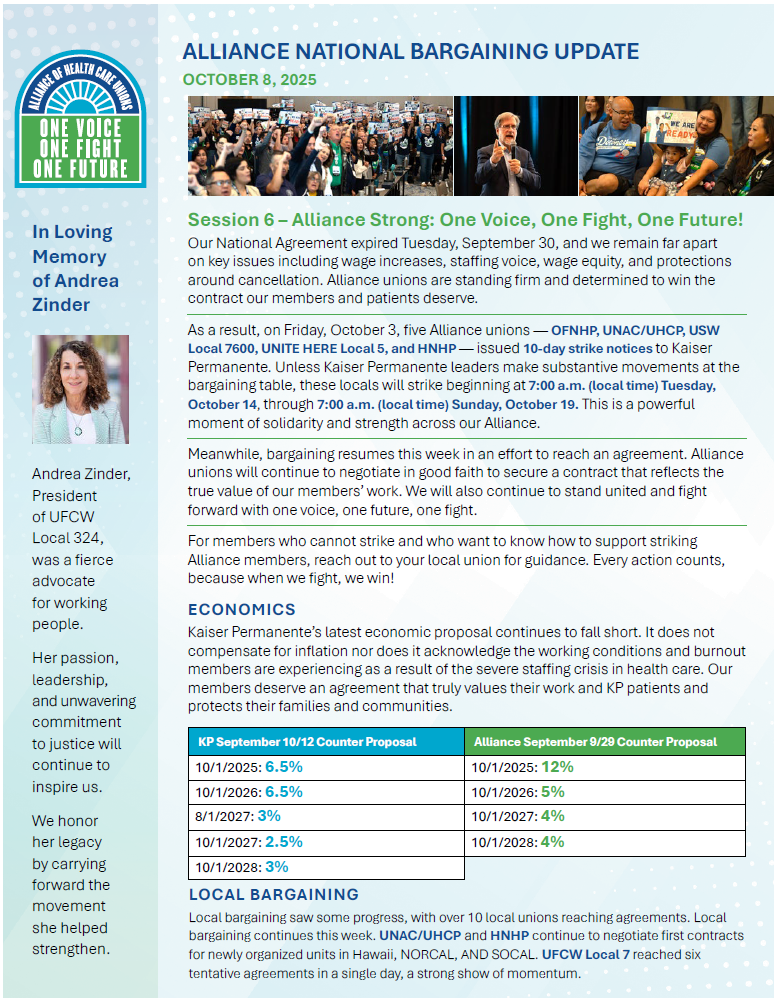Second Round of Bargaining Wraps up in Los Angeles
- Sandra Flores
- Jun 2, 2018
- 3 min read

“We’re learning from one another. The varied expertise in the room helped bring everything together.”
— LISA LOUCKS, UFCW LOCAL 555 AND LABOR SUBGROUP CO-LEAD
LOS ANGELES — Several hundred Alliance Union members spent three-and-a-half intense days working with managers, tackling issues in an Economics work group and two subgroups — Partnership and Operational Effectiveness.
The Partnership subgroup worked on two of their four deliverables: partnership expectations and LMP training.
To clarify partnership expectations, the subgroup recommended commissioning a workgroup to create a Playbook/Quick Start Guide outlining standard processes for partnership work, including values, expectations, roles, resources, examples, and other key principles and processes.
Next, the subgroup addressed training. Suzanne Delaney of UNAC/UHCP summed up the feelings of labor. “Partnership training is important, and everybody gets it.” We have one partnership, we need more widely available training with “accountability and consistency” across the regions. A recommendation endorsed by labor only calls for every employee to have a minimum number of hours of LMP training annually, including an annual LMP refresher.
To speed up and clarify decision making about LMP training, the subgroup began work on a national committee to standardize curriculum and make recommendations to the LMP Executive Committee. The subgroup also quickly agreed that LMP training should be incorporated into existing KP training.
“People don’t come to Kaiser knowing how to work in partnership, so they have to be taught,” said Alliance Chair Kathleen Theobald of KPNAA. “Without LMP culture, we don’t have success, and without success the money won’t come in for patient care.”
Members of the Operational Effectiveness subgroup devoted most of their time to deliverables on joint staffing, budgeting, backfill and attendance. Standing side by side, union members and managers brainstormed to identify their common interests and begin developing recommendations. They jotted ideas on colored sheets of paper and taped them to the wall for everyone to see and discuss. The process was invigorating. “We’re learning from one another,” said Lisa Loucks, UFCW Local 555 and labor subgroup co-lead. “The varied expertise in the room helped bring everything together.”
A key labor priority is to enforce existing agreements on joint staffing and backfill. To support transparency around staffing, the subgroup recommended the development of a template to communicate financial performance and budget information to workers. “Budget information relates directly to staffing and backfill, and it often is not available to frontline staff,” explained Loucks.
To improve enforcement of staffing agreements, the subgroup also called for regional (or business unit) oversight committees on staffing, backfill, and budgeting. The subgroup also recommended creation of a committee to develop a program and recommend a policy to support sponsorship and accountability around attendance.
Both the Partnership and Operational Effectiveness subgroups recommended that to increase accountability, enforcement, and ease of use, the contract writing team consider moving certain appendices in the National Agreement — most notably around staffing — from the back of the contract to the main body.
The labor and management members of the Economics work group also met on Friday. Representatives of every Alliance union, as well as senior leaders from the health plan, hospitals and medical groups were present. The parties shared interests and goals, including the Alliance’s commitment to achieve fair across-the-board wage increases, protect and improve our benefits, and address issues like outsourcing and protecting and improving our job security.
Over the three-plus days, we “had frank, honest and tough conversations,” said Joan Heller of UFCW 7. Added Greg Chavez of ILWU, “We got a rough start, but the relationships we formed will help us go on next time.”











Comments